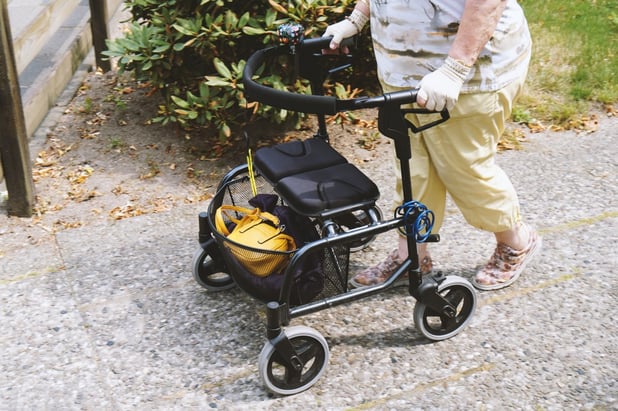
Due to the aging society there is an increasing need for appropriate technical devices for less dependent living. Walking aids, especially the so-called rollators, are frequently prescribed for people with gait and balance disorders to improve mobility. The term “rollator”, as defined by the International Organization for Standardization, is frequently used synonymous with the term “walker”, “wheeled walker”, “four-wheeled walker”, “rolling walker” or “walking frame”. Rollators are defined as walking aids with built-in handgrips and three or more legs of which two or more are having wheels, which provide support whilst walking. Additionally, they need to be equipped with a seat for resting.
Falls are a major issue in older adults. About one third of the people aged older than 65 years fall once a year and half of those aged 80 years and older fall every year. The risks for falls are manifold and mainly related to prior history of falls, functional impairment, use of walking aids, cognitive impairment or dementia, impaired mobility or low activity level, balance abnormalities, medications, and low muscle strength. The use of a walking aid is a surrogate for poor walking performance. Nevertheless, it seems paradox to refer walking aids to risk factors for falls, as they are supposed to increase users’ base of support and improve balance performance. Rollators are particularly prescribed to improve postural stability in patients with muscular weaknesses and balance impairments.
Benefits of walking
- Strengthen your muscles.
- Help keep your weight steady.
- Lower your risk of heart disease, stroke, colon cancer and diabetes.
- Strengthen your bones, and prevent osteoporosis and osteoarthritis (regular walking could halve the number of people over 45 who fracture their hip).
- Help reduce blood pressure in some people with hypertension.
- Improve your balance and coordination, and decrease your likelihood of falling.
- Keep your joints flexible.
- Increase your confidence and mood, and help you feel better all round.
- Improve your energy levels and increase your stamina.
- Reduce anxiety or depression.
- Improve your social life – walking is a great way to get out and meet people or socialize with your friends.
But what if you can’t walk without help
Being able to walk without help is one of the strongest indicators of whether someone can live independently. Seniors who exercise regularly are more likely to walk without assistance and do things for themselves around the house. But in some cases maybe an accident or a health issue limits our walking ability. If you’d like support but don’t have a cane or a walker, talk to your GP or physiotherapist for help. Remember, all walking aids need adjustment, and should be properly maintained. So see a professional to ensure you have the right fit along with anything else you might need. Here in Marx Medical we offer a wide arrange of walkers/rollators you can talk with us to determine how these could help meet your needs.
